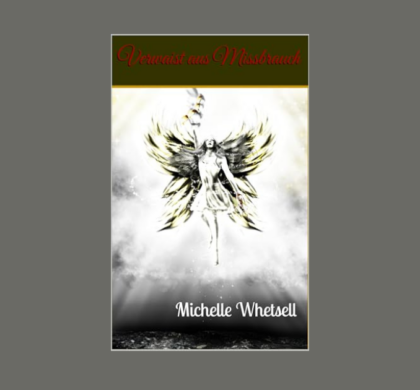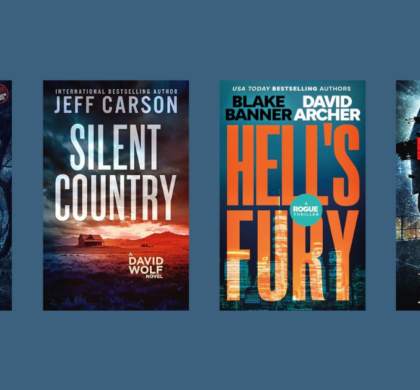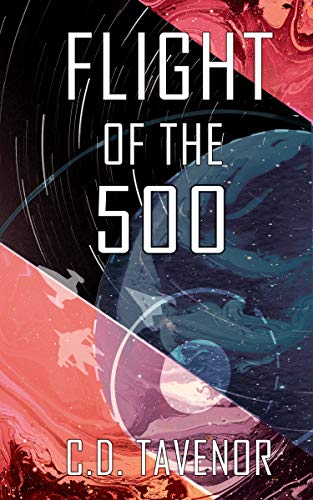Interview with C.D. Tavenor, Author of Flight of the 500
26 May 2020
What can you tell us about your new release, Flight of the 500?
To understand Flight of the 500, you must learn about the Indianapolis 500. One of the most famous automotive races in the world, it occurs every year, and my family has attended it for decades (supposedly, we had an ancestor at the first race in 1911). Last year, at the 2019 Indy 500, just a month after I released my first SciFi novel, I said to myself… what if I wrote a SciFi Racing Adventure novel inspired by the Indianapolis 500?
Thus, the concept for Flight of the 500 was born, and I quickly developed its outline and plot. It needed a fun cast of characters, and so we have Raith, the convict Synthetic Intelligence; Olive, the High-Tech corporate agent; Carter, the solo scoundrel explorer; Bonta, the slightly wacky robot; the Twins, two cyber-amplified sisters; and Harrison, the rough-and-tumble mechanic. Together, they’re thrown into a high-octane adventure at faster-than-light speeds, complete with black holes, asteroid belts, and giant [SPOILER]. It’s my love letter to the adventure SciFi genre! And most importantly, though Flight of the 500 takes place in the same universe as my other SciFi novels, First of Their Kind and Their Greatest Game, it is a stand-alone adventure, and readers don’t need any knowledge of the other books to enjoy the story.
What or who inspired you to become an author?
I started writing stories from an early age. When I was nine or ten, I attempted writing a SciFi novel, and while I wrote a few chapters, it ended up being hopelessly derivative of Star Wars and other pop SciFi. Still, I continued writing (dabbled in fan fiction for a few years), and eventually I started drafting my first full-length novels near the end of college. I’ve always had the drive to write, mostly inspired by my love of the expansive universes, such as those of Tolkien, Jordan, and Herbert.
What’s on your top 5 list for the best books you’ve ever read?
Dune (Frank Herbert)
Forever War (Joe Haldeman)
The Left Hand of Darkness (Ursula K. Le Guin)
How Long ‘Til Black Future Month (NK Jemisin)
Too Like the Lightning (Ada Palmer)
Say you’re the host of a literary talk show. Who would be your first guest? What would you want to ask?
I would invite Brandon Sanderson onto the show to discuss the process of finishing The Wheel of Time after Robert Jordan died. While Sanderson has discussed the topic extensively in the past, I think it’s a conversation worth continuing and exploring in additional detail. I can’t imagine the monumental pressure placed on his shoulders, being tasked with finishing a fourteen book series authored by another writer over the span of two decades. And Sanderson, in my opinion, succeeded! So my very first question I would ask Sanderson: What lesson did you learn from finishing The Wheel of Time that you’ve taken with you into your subsequent stories?
What’s your favorite thing about writing?
The moment when you write a scene and you know it’s near-perfect. It doesn’t happen often, but sometimes, all the pieces click into place during the first draft where the words flow, the conflicts clash, and the plotlines converge in a maelstrom. When you exit the 2000-word writing frenzy, you know: “I created something people will love.” At least, that’s what you hope, because you can never predict reader reactions!
What is a typical day like for you?
I wake up around 6am and write and/or edit until about 9am. Then, I work during the day as a public interest environmental attorney, because the climate isn’t going to save itself! Once the day winds down, and it’s the evening, I’ll often write or edit some more, or otherwise play a board game with my wife or watch a TV show. Lately, during the pandemic, we’ve been scratching our creative itch by building with Lego while watching movies.
What scene in Flight of the 500 was your favorite to write?
There’s a moment late in the race (so late in the book) where Raith, our all-star pilot, attempts a daring maneuver to out-pace other racers while navigating around a black hole. I had a lot of fun writing it–and while I play fast-and-loose with some physics (we’re talking about a race occurring at relative faster-than-light speeds, after all), I like to think I’ve created a moment that feels real under the rules established for my world. But the maneuver itself isn’t my favorite part of that scene–throughout the entire moment, Raith and another racer are arguing back and forth with one another about the meaning of the universe, all while they’re speeding past a black hole. I like to think there’s some pretty clear symbolism for readers. And what happens right after they pass the black hole… well, you’ll need to read Flight of the 500 to find out.
Do you have a motto, quote, or philosophy you live by?
Everyone has a story to tell, whether it’s about themselves or a fictional world. When humans understand each other’s stories, it’s almost impossible to hate one another. Empathy, love, and trust are built on understanding, so above all else, people need to hear and understand the stories of people unlike themselves.

C. D. Tavenor is the author of the new book Flight of the 500.
Connect with C. D. Tavenor
Author Site
Facebook
Buy The Book
Sign up for our email and we’ll send you the best new books in your favorite genres weekly.
Related
grant
Recommended Posts

Interview with Michelle Whetsell, Author of Verwaist aus Missbrauch
24 Dec 2024 - Author Interviews, eBook, News

New Mystery and Thriller Books to Read | December 24
24 Dec 2024 - eBook, Mystery, News, Thriller, Weekly Releases

New Romance Books to Read | December 24
24 Dec 2024 - eBook, News, Romance, Weekly Releases
